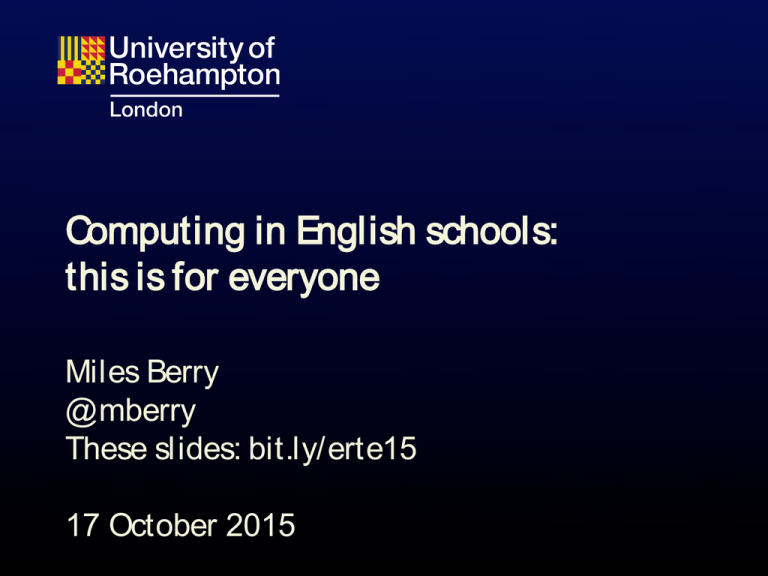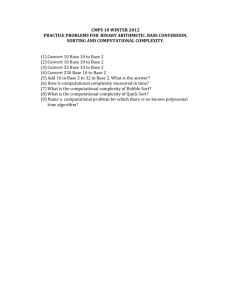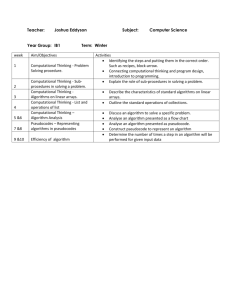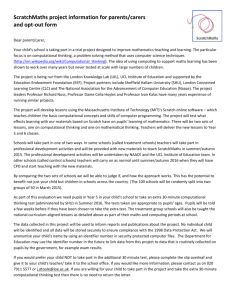Computing in English schools: this is for everyone
advertisement

Computing in English schools: this is for everyone Miles Berry @mberry These slides: bit.ly/erte15 17 October 2015 Outline Rationales From ICT to Computing Curriculum content Support Challenges ahead Why teach CS to school children? I wonder how this works? machine.com The zeroth science uter Entertainment UK plc / Portugal Lda An uncertain future 20 0 1 Music Service A liberal education in the third millennium Tools to think with Mindstorms Designing a computing curriculum From consumers to creators Users Communicators Digitally literate Safe Skills Magic Makers Collaborators Digitally critical Responsible Understanding Knowledge Beauty or utility? If you want a golden rule that will fit everybody, this is it: Have nothing in your houses that you do not know to be useful, or believe to be beautiful. Morris, 1880 Computer Science Information Technology Digital Literacy Foundations Applications Implications Aims can understand and apply the fundamental principles and concepts of computer science, including abstraction, logic, algorithms and data representation can analyse problems in computational terms, and have repeated practical experience of writing computer programs in order to solve such problems can evaluate and apply information technology, including new or unfamiliar technologies, analytically to solve problems are responsible, competent, confident and creative users of information and communication technology DfE, 2013 Computing A high-quality computing education equips pupils to use computational thinking and creativity to understand and change the world. DfE, 2013 Computational thinking Getting computers to help us to solve problems is a two-step process: 1. think about the steps to solve a problem or the rules that govern the system 2. use your technical skills to get the computer working on the problem. Computational thinking is the first of these. It describes the concepts, processes and approaches we draw on when thinking about problems or systems in such a way that a computer can help us with these. Berry 2015 EYFS Before 5 Before 5 Key Stage 1 5 - 7 years old understand what algorithms are, how they are implemented as programs on digital devices, and that programs execute by following a sequence of instructions create and debug simple programs use logical reasoning to predict the behaviour of simple programs recognise common uses of information technology beyond school Key Stage 2 7 - 11 years old use sequence, selection, and repetition in programs; work with variables and various forms of input and output use logical reasoning to explain how some simple algorithms work and to detect and correct errors in algorithms and programs understand computer networks, including the internet; how they can provide multiple services, such as the World Wide Web, and the opportunities they offer for communication and collaboration Key Stage 3 11 - 14 years old design, use and evaluate computational abstractions that model the state and behaviour of real-world problems and physical systems import random for i in range(5): a = random.randint(1,12) b = random.randint(1,12) question = "What is "+str(a)+" x "+str(b)+"?" answer = int(input(question)) if answer == a*b: print("Well done!") else: print("No.") use 2 or more programming languages, at least one of which is textual, to solve a variety of computational problems; make appropriate use of data structures; design and develop modular programs that use procedures or functions understand simple Boolean logic and some of its uses in circuits and programming; understand how numbers can be represented in binary, and be able to carry out simple operations on binary numbers Key Stage 4 14 - 16 years old All pupils should be taught to: develop their capability, creativity and knowledge in computer science, digital media and information technology develop and apply their analytic, problem-solving, design, and computational thinking skills understand how changes in technology affect safety, including new ways to protect their online privacy and identity, and how to report a range of concerns DfE, 2015 Key Stage 5 16-18 years old AQA, 2015, qv AQA, 2015 University entrance Useful for: Aeronautical engineering Biochemistry Biology Chemical engineering Economics Chemistry Civil engineering Geology / Earth sciences Electrical / Electronic engineering Engineering Mathematics Mechanical engineering Medicine Materials science Optometry Orthoptics Pharmacy Physics Psychology Sociology Teacher training (!) With a little help from our friends Computing at School: Hubs Computing at School: Master Teachers CAS resources Be careful what you wish for... Transition DfE: By the end of each key stage, pupils are expected to know, apply and understand the matters, skills and processes specified in the relevant programme of study. Ofsted: The statutory requirement from 1 September 2014 is for maintained schools to teach the relevant national curriculum programmes of study by the end of the key stage. Why programming? the practical experience of programming, [is] almost certainly the best way for primary pupils to learn about computer science Berry, 2013 Programming develops thinking I began to see how children who had learned to program computers could use very concrete computer models to think about thinking and to learn about learning and in doing so, enhance their powers as psychologists and as epistemologists. Papert, 1980 But teach problem solving too We find that the entry level of Logo does not present conceptual problems for the school-aged child... With accompanying instruction in thinking skills, developments in planning skill may in fact be achieved. Pea, 1983 In summary It’s not about the coding It’s easier to read code than to write code It’s easier to edit code that to start from a blank screen Look for interesting contexts Making things matters Pair programming is powerful Debugging helps grow mindsets Go for depth not breadth Nurture curiosity This is for everyone Teaching matters The quality of an education system cannot exceed the quality of its teachers Interview South Korea 2007, cited in Barber and Mourshed 2007 CPD matters We know that teachers learn best from other professionals and that an ‘open classroom’ culture is vital: having the opportunity to plan, prepare, reflect and teach with other teachers... [and yet] two-thirds of all professional development is ‘passive learning’ – sitting and listening to a presentation. DfE, 2010 Some CAS research questions How should we teach programming to children? How effective are “unplugged” approaches to learning computer science? How should we assess computing? Does an early education in computing improve outcomes in Maths or English? How can computational thinking skills enrich learning in maths, science, and other subjects? In what order are computational concepts best learned? Women are massively under-represented in computing. What practical strategies help? Questions? @mberry m.berry@ roehampton.ac.uk milesberry.net These slides: bit.ly/erte15


